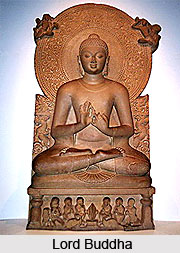 The last postulate of the concept of Spiritual Training or Sadhana is Eradication of Craving. It has been said that the greatest obstacle in the path of meditation is craving. Attachment, affection, enjoyment, passion and craving all are hindrances which bring in fear and sorrow. In fact the fetters of craving are so vicious and so attractive that people fall a prey to it. Anyone who falls into the pit of craving is doomed forever. Lord Buddha had said, "The torrents of craving are very attractive and fascinating. People flowing in these torrents to seek pleasures undergo birth and decay again and again".
The last postulate of the concept of Spiritual Training or Sadhana is Eradication of Craving. It has been said that the greatest obstacle in the path of meditation is craving. Attachment, affection, enjoyment, passion and craving all are hindrances which bring in fear and sorrow. In fact the fetters of craving are so vicious and so attractive that people fall a prey to it. Anyone who falls into the pit of craving is doomed forever. Lord Buddha had said, "The torrents of craving are very attractive and fascinating. People flowing in these torrents to seek pleasures undergo birth and decay again and again".
According to Dhammapada one who is desirous of attaining the goal of Nirvana must free himself from the shackles of craving. One who throws away this fetter of craving attains the goal of Nirvana and he becomes emancipated from the cycles of birth and death. The Lord had proclaimed in the Dhammapada that surrendering of all craving helps an aspirant to attain the Goal of Nirvana which is the ideal state where there is no desire, no craving, no like, no dislike, no attachment, no infatuation, no lust, no passion, no greed and no anger. Total tranquility, total peace and total bliss are the essence of this ideal state.
It has been said in the Dhammapada that people who are bound by craving undergo a continuous suffering and the Lord had advised his disciples that if an individual seeks Nirvana in the very first place he should drive away all kinds of craving from his mind. A man who is not able to get rid of his cravings gets overwhelmed with sorrow but a person who is able to overcome his cravings is freed from all sorrows of life.
Lord Buddha in this section of Dhammapada had advised his disciples that one should uproot his cravings completely and the menace of craving can be overcome only with the help of wisdom. He had said that one should emancipate his mind from past, present and future and should dwell on a different shore of existence then only it is possible to end the cycles of birth and death. According to the Lord the vices of life are affection, enmity, infatuation and craving. Unless all these cease to exist it is not possible to attain salvation.
Dhammapada has opined that wise people renounce the world free themselves from all desires and cares and leave all sorrow behind. It has been said that the craving of such a man would go on increasing who is tossed about by doubts, who is full of strong passions and who always yearns for pleasures of senses. Indeed such a man makes his manacles strong in the process. On the other hand one who delights in quieting his doubts, who is vigilant and dwells on what is not delightful, will be able to remove craving. He will also be able to cut the bondage of the Mar (the Tempter).
Finally this section of Dhammapada concludes saying that he who has attained the Goal, who is fearless, who is devoid of craving and who is without sin and has been able to remove the thorns of life. It has also been said that a man who is devoid of craving, free from attachment, who is skilled in understanding words and their meanings, who knows the arrangement of letters, he indeed is a great man. In fact he is called the bearer of the last body and a man of profound wisdom.




















